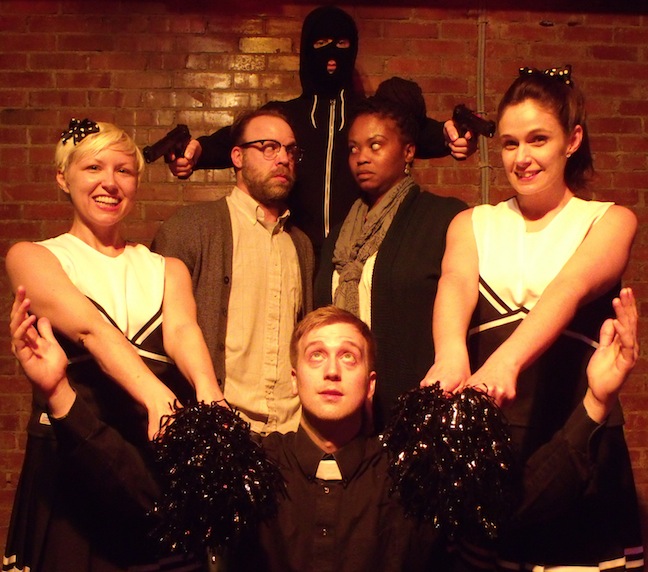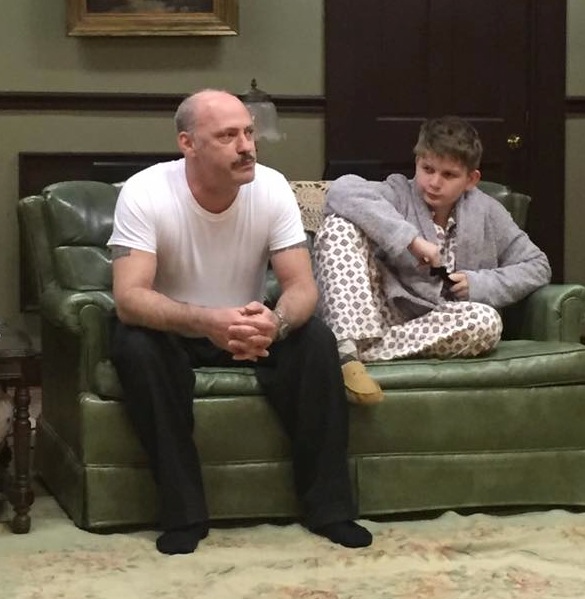By Kathi E.B. Ellis.
Entire contents are copyright © 2012 Kathi E.B. Ellis. All rights reserved.
On January 12 and 19, Actors Theatre of Louisville hosted community conversations, following the performances of The Elaborate Entrance of Chad Deity, with an invited panel of community activists engaging in a dialogue with audience members.
On both evenings, panelists and audience members at Actors Theatre of Louisville grappled with a perennial area of discomfort: how Louisville handles issues of race relations, filtered through the issues addressed in The Elaborate Entrance of Chad Deity. Diaz’ script is a brilliant deconstruction of race in early 21st century America, with Hispanic, African-American and Asian characters working within the white-monopolized media system. Panel moderator the Reverend Doctor Rhashell D. Hunter moved deftly between production-inspired comments from audience and panelists alike and audience testimonies that spoke to the deep-seated challenges faced in the increasingly multi-cultural community that Louisville is becoming.
Panelists included Lara Miramontes, Americana Community Center; Ben Ruiz, volunteer with and board member of community non-profit organizations supporting Hispanic/Latino populations (both evenings); Sundar Sridharagopal, founder of Techneek.Biz and active in business leadership circles (January 12); and Sonja Grey, president of the Louisville Urban League Young Professionals (January 19). The panelists spoke both to the vibrancy of communities of refugees and immigrants, and to the overt and more subtle forms of discrimination each of them face on a regular basis. Panelists were careful to acknowledge the strides that Louisville has made in working with and supporting communities of refugees and immigrants, the ‘internationals’ as Ms. Miramontes identified them. Mr. Ruiz averred that Louisville is ahead of the curve compared with other cities in the way that dialogue has been established with these new communities. Nonetheless, both panelists and audience members returned to the challenges faced by the browning of the country and Louisville, and how patterns of communication are shifting from the black-white paradigm of much of the twentieth century to the more complex interactions between all ethnic communities as well as the interactions between them and the white community.
Many of the audience members who spoke addressed the issue of white privilege – an attitude that many whites carry with them, albeit unconsciously – that permeates communications and relationships across the cultures. It was also stated that there are few safe spaces in our community in which we can have this kind of conversation – maybe ATL has found a niche with this initiative – and there were times when it was an uncomfortable conversation. These are difficult ideas to hear; framing conversations of ‘other-ness’ generates strong passions, and we don’t often get practice articulating these ideas, which can lead to hostility and defensiveness – and, yes, those moments occurred during these dialogues. Nonetheless, audience and panelists kept coming back to wanting to respect all cultures and each of us as individuals – a good starting point to continue this conversation with a broader cross-section of the community.
An unanticipated testimonial happened towards the end of the first evening. The fight director for the production, Al Snow, was introduced and he took to the stage, microphone in hand, to deliver a passionate and articulate analysis of the veracity of the script’s illustration of racism, based on simple stereotypes, within the world of pro-wrestling. He attributed the success of this formula to the geographic isolation of the U.S., relative to other parts of the world where multiple cultures have lived cheek by jowl for centuries. Do those countries always get multi-culturalism right? No. But fear and anger (the emotions he identified that promoters manipulate) are generated by lack of knowledge and familiarity of the other, which is a frequent condition in our country. The following week audience members spoke to the way the play articulates the roles we play within our families, cultures and communities, and how we shift those roles when we interact with different cultures, power structures and communities, frequently playing the role that the dominant culture ‘expects’ us to play. Speakers found strong parallels between their own experiences and the dynamics portrayed in the world of “Chad Deity” with the experiences of the Hispanic and Asian characters as they interact with African-American and white characters.
These post-show conversation demonstrated how an energetic, comic and poignant production can generate a discussion that we can take back into our community at large, and not just leave in a theatre, that audiences can go back into the world changed by their theatrical experience as Dr. Hunter said, wrapping up the final conversation. It’s an indicator of the vitality and relevance of the arts in this community that around a hundred people chose to stay after a production to talk about how the arts can impact issues in our community.
Kathi E.B. Ellis is a member of the Lincoln Center and Chicago Directors’ Labs and an associate member of the Stage Directors & Choreographers Society. She has attended the LaMama Directing Symposium in Umbria, Italy, and is featured in Southern Artisty, an online registry of outstanding Southern Artists. Her directing work has been recognized with nominations for the South Florida Theatre Carbonell Award. Locally, Kathi is a member of Looking for Lilith Theatre Company, a founding principal of StageLab theatre training studio, and is part of ShoeString Productions an informal producing collective. She has written book reviews and articles for Southern Theatre, the quarterly publication of the Southeastern Theatre Conference, and was a contributing writer for JCPS’ textbook for the 11th grade Arts and Humanities survey course and for YouthArts Tapestry, a Kentucky Arts Council publication.




